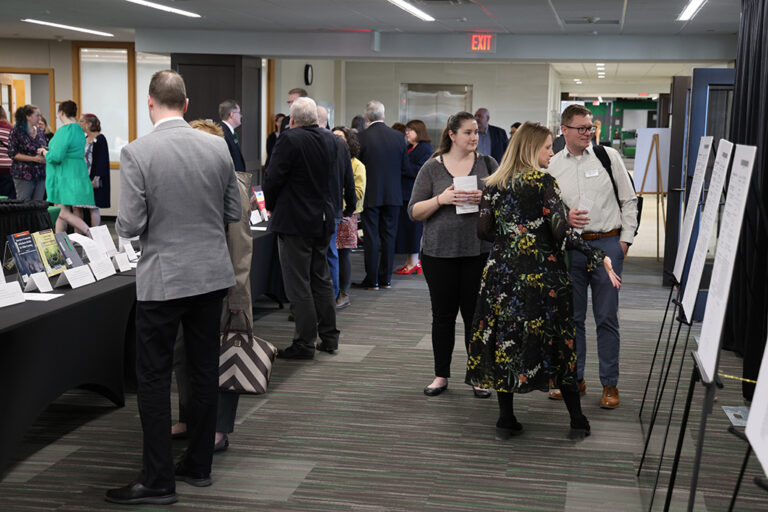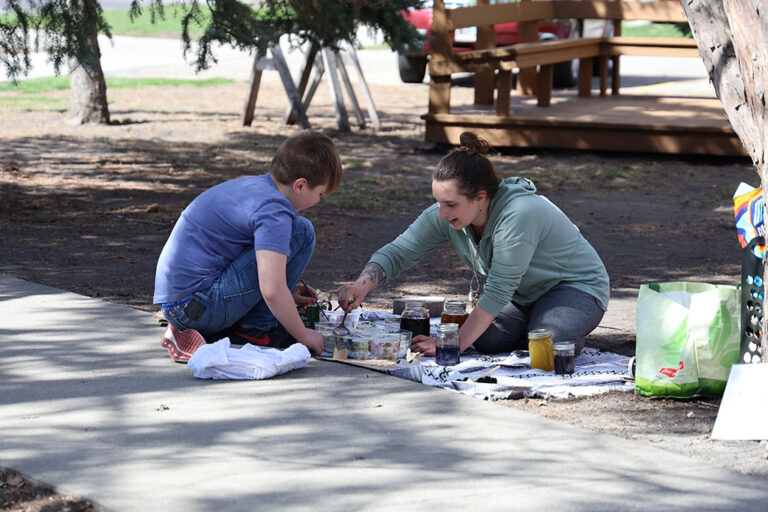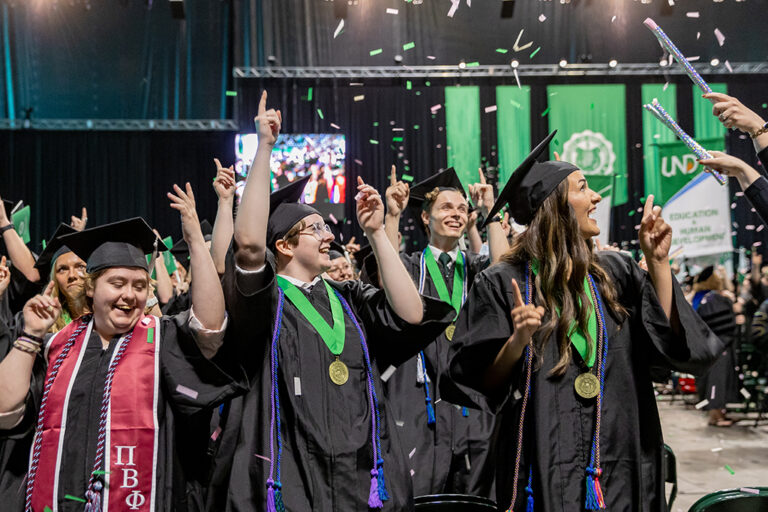UND-hosted conference breaks boundaries
Day-long conference focuses on LGBTQ+ issues in higher education

On Tuesday, Oct. 10, the ballroom of the Memorial Union housed 200 attendees anticipating a day-long conference focused on LGBTQ+ issues in higher education. The programming included a state of affairs presentation by the director of the UND Pride Center, Jeff Maliskey, as well as eight sessions by led academics and experts from various disciplines.
The event, formally titled “Queer Resilience: Breaking Boundaries,” sought to explore the current state of LGBTQ+ programs, initiatives and support systems in higher education, plus cover recent trends and current practices related to LGBTQ+ populations in higher education.
The event was co-organized by Maliskey and North Dakota State University faculty members Christopher Whitsel and Jamee Larson. Notably, it showcased the efforts of UND students, faculty and staff to implement various programs and initiatives to promote inclusivity and community for LGBTQ+ students.
This is an important consideration for higher education institutions, said Maliskey during his lead-off presentation, because Gallup Poll data from 2022 showed that students aged 15 to 20 who self-identified as being gay, lesbian, asexual or queer had increased to 17%. Additionally, 1.7% percent in the same age group self-identified as trans and nonbinary.
The hope, Maliskey said, is that attendees could take the information presented at the conference and implement it in their own institutions. This is a crucial step toward building acceptance on campuses, a task thought now more important than ever due to a disproportionately high instance of mental health issues in LGBTQ+ student populations.
A survey of 1,000 LGBTQ+ students aged 18-40 in America revealed that 92% of LGBTQ+ students felt that their college experience had hurt their mental health, Maliskey said. One of the reasons for this has been a lack of formal support systems and initiatives for their demographic.
Focal points of inclusion such as UND’s Pride Center, in addition to other campus inclusivity initiatives, are essential to UND’s mission of promoting inclusivity and community. Maliskey said that they are also integral to the academic success of LGBTQ+ students.
“When students don’t feel like they have the support structures in place — those pieces to create a social network — the likelihood for them to succeed at your university is very low,” Maliskey said.
UND is one of the few higher education institutions in the region to have a dedicated resource space for LGBTQ+ students such as the Pride Center. Maliskey said that the Campus Pride Index, a tool used to measure the LGBTQ+ friendliness of campuses, is a good barometer for the success of a campus in supporting LGBTQ+ students.
The Pride Center has been instrumental in assisting colleges and departments around campus increase their LGBTQ+-related initiatives, and UND had several representatives from several disciplines present at the institute.

The UND School of Law, for example, held a panel emphasizing how inclusivity for LGBTQ+ students can be practically applied both in and out of the classroom. Julia Ernst, professor at the School of Law and 2022-23 winner of the Pride Center’s Advocate Award, introduced three students who shed light on their school’s efforts to support LGBTQ+ students and broader community.
One of the student panelists, Mishaye Belgarde, said that she had revived the Multicultural Law Students Association (MLSA) because she personally felt that there should be a space where students like her could belong.
“There was a need for a group of students like me,” Belgarde said of the group, which had been dormant since 2018 prior to its revival. The MLSA has collaborated with Maliskey and the Pride Center on events and programming, she said.
Most recently, the MLSA hosted their annual Flamingo Flocking Fundraiser which raised funds for the Trevor Project, a charity that provides mental health and suicide prevention support for LGBTQ+ youth.
Belgarde, also the president of the MLSA, said that the revival of the organization was also about preparing her and her colleagues better and more competent legal professionals in the future.
“The point was to bring that presence to the law school, because, in the legal profession, a lot of our colleagues and clients are going to be part of the LGBTQ+ community,” Belgarde said. “It’s important for us to be aware of that and know what the best approaches will be as legal professionals.”
They also noted that at the end of the month, representatives from the UND School of Law will also be attending an LGBTQ+ summit in Bismarck, an event that is also sponsored by Ernst and the MLSA.

Angie Freeman, the events and partnership program manager at the University of Michigan’s Spectrum Center, presented a keynote speech over the lunch hour. Freeman’s speech was centered on the idea of practicing allyship in a way that is productive and beneficial to the community.
“I will suggest that we expand our thinking and practice of allyship,” Freeman said. “The thing is that allyship has great intentions, but if you call yourself an ally and don’t do anything else, it’s not enough.”
Freeman asked attendees to consider focusing on meaningful actions rather than empty public gestures such as posting on social media. For example, rather than simply labeling themselves as advocates of LGBTQ+ communities, attendees should consider actionable ways to show their support, Freeman suggested.
It’s uncomfortable to speak up when witnessing the bullying, harassment or marginalization experienced by LGBTQ+ students, Freeman noted. But speaking up is a necessary step in creating a more inclusive campus community, even if your actions go unnoticed.
“Do the work when nobody’s looking,” Freeman said. “Don’t post about it, don’t share it; do the work like nobody is looking. I’m asking you to commit to your actions.”
After Freeman’s keynote speech, Anne Kelsch and Anna Kinney presented a panel on behalf of UND’s Teaching Transformation and Development Academy (TTaDA), which showed how allyship could be practically applied in classroom settings.
Framed around the idea of allyship in the classroom, the major focus of TTaDA’s session was its case studies. Three classroom scenarios were presented to attendees, who then participated in group discussions followed by a debrief and feedback portion facilitated by Kelsch and Kinney.
The group discussions revealed diverse approaches to solving the complex situations presented. The major takeaway was that careful consideration must be given when confronted with the negative personal and social aspects LGBTQ+ students can experience in the classroom.
Given the opportunity to discuss and debrief with the facilitation of staff members from TTaDA, attendees were able to develop a framework for diffusing difficult situations while also reaffirming the experiences of LGBTQ+ students.

Another session, hosted by Kaitlyn Kelly and Ellen Steidl from the College of Nursing and Professional Disciplines (CNPD), revolved around treating sexual and gender minorities in healthcare.
Their workshop incorporated Sim-Converse, a software recently implemented into the department’s first year student program as an addition to the program’s robust simulation lab curriculum. Attendees were able to try the software and practice using gender-affirming language in a module designed to approximate the treatment of a trans patient.
CNPD has utilized Sim-Converse, along with LGBTQ+ standardized patient exercises, to fill gaps that they have identified in healthcare education related to LGBTQ+ patients.
Much like the School of Law, the College of Nursing’s session emphasized the importance of training future professionals, widening the scope of allyship from higher education to the development of skills with unique professional applications.
UND’s offerings at the day-long institute were just a portion of what the event offered attendees. Other sessions included presenters such as Faye Seidler, a suicide prevention advocate and founder of a LGBTQ+ community resource group Harbor Health Initiative, as well as sessions led by NDSU and Valley City State University faculty and staff.
Maliskey said that he was pleased with the turnout of the event. UND’s various initiatives and programs presented a framework for other colleges and universities to apply on their own campuses, he noted.
In his opening speech, Malinsky said that a commitment to this kind of programming recognizes the value of LGBTQ+ students not only as members of the campus community, but also as future members of the North Dakota workforce.
“There’s a workforce and economic impact to these initiatives as well,” he said. “We don’t always think about it this way, but LGBTQ+ students will go on to do meaningful work in the state and help the economy.”



